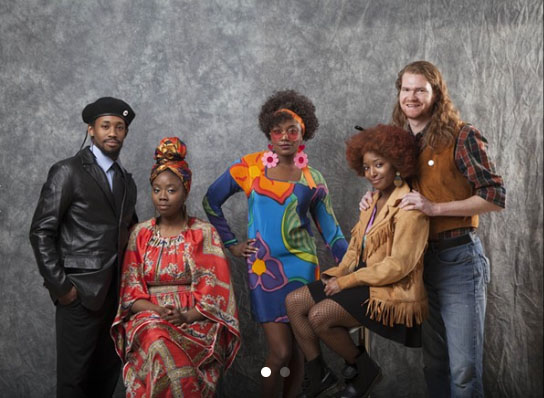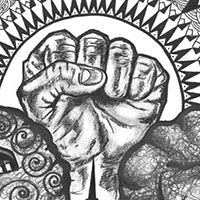Anthony the Dancer will open the production
Friday – Saturday, May 10 – 11, 7:30 p.m., Orcas Center
— from Norm Stamper for Woman in the Woods Productions —

In 1968 the streets of many American cities were filled with demonstrators, full-throated political activists clashing with police as they pushed an anti-war, anti-capitalist, anti-racist agenda. The Black Panther Party, its members decked out in black berets and packing rifles, was center-stage at insurrections in Chicago, Newark, L.A., Oakland, and many other urban centers—including Seattle, where founding member Aaron Dixon led Panther-sponsored community breakfasts along with fervent street protests.
Thirty-one years later, in 1999, the streets of Seattle were clogged with a precedent-setting 50,000 anti-World Trade Organization, anti-globalization protesters, chanting opposition to human-trafficking, child exploitation, unjust labor practices, systemic racism and discrimination, environmental crimes, and much more.
What do these turbulent periods—the late sixties, the late nineties—have in common (other than marking the beginning, in San Diego, and the humbling end, in Seattle, of my 34-year career as a police officer)? As Seattle playwright Amontaine Aurore makes clear, the answer is…everything.
In her wonderful new play, Don’t Call it a Riot, Aurore asks, “What would you give up to do the right thing.” For her, it’s not a rhetorical question. Nor is it, by design, a salute to Spike Lee’s 1989 tour de force, Do the Right Thing (though a strong case for comparison could be made).
It’s 1968. Reed (Meysha Harville) is newly married and pregnant. The woman could be forgiven for retiring to a place of shelter and tranquility as she prepares to give birth. But that’s not who Reed is. She is all about helping to create a world of social and economic justice. A world where all people, including her unborn child, have equal access to freedom, health care, housing, education—and the kind of joy that is all but impossible in the face of grinding poverty and inequality.
Seattle’s Black Panther Party, like chapters elsewhere, embraced an armed liberation model whose focus was twofold: confronting police—and other institutional—racism and brutality, and providing direct aid to historically oppressed and underserved people in the community.
In Act 1, Reed’s best friend Marti (Lillian Afful-Stratton) moves in with her and her husband, Sam (Mic Montgomery), a visionary, charismatic captain of the local Party. Unbeknownst to Reed, the stage has been set for an act of betrayal that powerfully affirms the aphorism, “the personal is political.”
Thirty-one years later, in Act 2, intimate relationships against a backdrop of the “Battle in Seattle” drive the personal-is-political theme home. Marti’s daughter, Falala (Skylar Wilkerson), now a “grown ass woman,” and her boyfriend, Paris (Robert Lovett), quarrel over tactics for the upcoming protests. One is an exponent of property destruction, “if necessary,” while the other steadfastly rejects all forms of violence.
Reed, now living a quieter, more mainstream life in Los Angeles, nonetheless remains committed to the cause of justice. Falala invites her to return to the streets to deliver what she hopes will be an impassioned anti-globalization speech at the protest.
Not until Reed and Marti reunite in Seattle does Reed learn the painful truth of the earlier deception, a revelation that leads her to a fraught revision of past events—and their current significance. If you think you’ve puzzled out the betrayal, you’re likely wrong—just one of Aurore’s masterfully maddening tricks.
Riot is not all political strife and interpersonal animus. On the contrary, Aurore’s own deft blending and balancing of the political and the personal combined with her trademark flair for humor, music, and joyful dance leavens the production. Moreover, as a diligent researcher and astute observer of human behavior, the playwright consistently populates her sets with characters as authentic and contradictory and human as any we’ve met in life outside the theater.
Aurore grew up in an all-white neighborhood, and attended a white school. And while raised by a loving, nurturing family—something her sister, our own Michell “Mitch” Marshall, President and CEO of WIWP can attest—she was made to feel different, like she didn’t belong. Aurore recently told a reporter that her creative work today is intended, in part, to convey: “I’m not going to allow anyone to make me feel ‘less than’ [ever again].” One of her aims in life—and on the page, and the stage—is to “present activism in a light where people can be more cognizant of the demands of the role.” And, presumably, to choose, with eyes and heart wide open, a life of activism over a life on the sidelines.
The playwright’s previous productions at Orcas Center, Free Desiree and Love Letters Beyond the Veil, were immensely popular with local audiences, and they were critically acclaimed from Seattle to New York. Riot will certainly solidify Amontaine Aurore’s standing as a spellbinding storyteller.
She will join us for the performances on May 10 and May 11. A Q&A with the playwright and yours truly will follow both shows.
The Kitchen will be providing toothsome small bites before the Friday evening show, and both nights will feature an opening act by local gem, Anthony The Dancer at 7 p.m. Doors open at 6:15.
Tickets are available at The Office Cupboard, Orcas Center, or online at Strangertickets.com.
Looking forward to seeing you there!
**If you are reading theOrcasonian for free, thank your fellow islanders. If you would like to support theOrcasonian CLICK HERE to set your modestly-priced, voluntary subscription. Otherwise, no worries; we’re happy to share with you.**









NEWS FLASH: In the dance piece which introduces the play, Anthony the Dancer will be joined by Aristotle Luna!